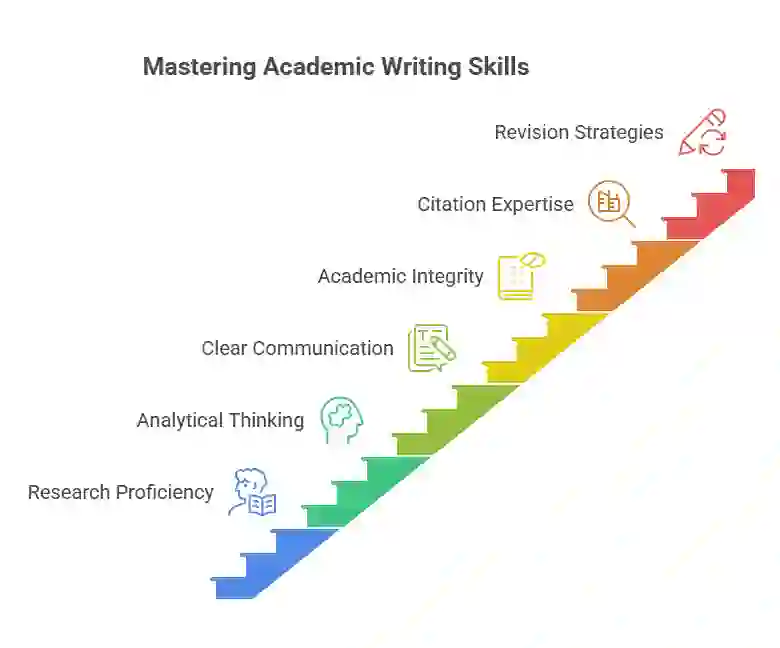I’ve spent years improving my writing skills. I think it’s key for anyone wanting to succeed in academic writing. Being able to explain complex ideas simply is a must for writers aiming high in this field.
To keep up, you need to learn the key skills for top-notch content. If you’re interested in this field, check out Write Remotely for the latest job openings.
Key Takeaways
- Mastering key skills is vital for success in academic writing.
- Clear and concise writing is key for sharing complex ideas.
- Developing key skills leads to better content.
- Staying ahead means always learning and getting better.
- Exploring academic writing can lead to a rewarding career.
My Personal Path to Becoming an Effective Academic Writer
Looking back, my journey to becoming a skilled academic writer was full of ups and downs. It started with a strong wish to get better at writing research papers. This was because I wanted to produce top-notch work.
Challenges I Faced in Early Academic Writing
At first, I found it hard to organize my thoughts and share complex ideas simply. I struggled to make my writing logical and easy to follow. This often made my writing confusing and hard to understand.
Some of the specific challenges I faced included:
- Crafting clear thesis statements and topic sentences
- Synthesizing complex information into a cohesive narrative
- Managing citations and references effectively
How Developing These Skills Transformed My Work
As I worked on improving my writing, I saw a big change in my work’s quality. I got better at building strong arguments and sharing my research clearly and briefly.
| Skill Developed | Impact on My Work |
| Improved research proficiency | Enhanced the credibility and validity of my research findings |
| Better analytical thinking | Allowed me to construct more compelling arguments and critiques |
| Clear and precise communication | Improved the readability and impact of my academic writing |
If you want to get better at academic writing, check out Write Remotely. It offers the latest job listings and opportunities to improve your skills.

Research Proficiency: The Foundation of Scholarly Writing
Developing strong research skills has greatly improved my academic writing. It’s not just about finding information. It’s about carefully looking at and combining what’s already known to create something new and meaningful.
Systematic Literature Review Approaches
A systematic literature review is key to research skills. It means doing a thorough search of literature with clear methods. I start by setting research questions, finding the right databases, and using specific criteria to choose what to include.
Evaluating Source Credibility and Relevance
Not every source is trustworthy. It’s important to check if a source is credible and relevant. I look at the author’s background, the publication’s standing, and the research method. For example, peer-reviewed articles are usually more reliable than others.
Key Factors in Evaluating Source Credibility:
- Author’s qualifications and expertise
- Publication’s impact factor and reputation
- Methodology and research design
Tools I Use to Organize Research Materials
Keeping research organized is key to writing well. I use tools like EndNote and Zotero to manage my references and PDFs. These tools help me sort, note, and cite sources correctly.
| Tool | Functionality | Benefits |
| EndNote | Reference management, citation formatting | Efficient citation management, integrates with word processors |
| Zotero | Reference management, PDF organization | Free, open-source, collaborative features |
For the latest opportunities in academic writing, consider visiting Write Remotely for job listings.
Analytical Thinking: Elevating Your Academic Writing
Analytical thinking is key in academic writing. It helps writers make strong arguments and mix complex info well. I’ve seen how important it is for top-notch academic work.
Constructing Compelling Arguments
Building strong arguments is a big part of analytical thinking. It means critically looking at evidence, spotting patterns, and making smart conclusions. This way, writers can share their ideas clearly and convincingly.
Synthesizing Complex Information
It also helps writers mix info from different places. They break down hard ideas into easy parts, study them, and put them together in a story that makes sense. To do this well, you need to really get the topic and see how different bits fit together.
Developing Critical Perspectives
Also, analytical thinking helps in creating new views. By asking questions and doubting what’s known, writers can share new ideas. This makes their writing better and helps knowledge grow.
If you want to get better at analytical thinking, look for resources on critical thinking and making arguments. You can also try new things by checking out places like Write Remotely for jobs and projects that test your skills.
Clear and Precise Communication Skills Every Academic Writer Needs
Effective academic writing means sharing complex ideas clearly. As writers, we must make sure our message is understood. This skill goes beyond just writing well.
Structuring Your Manuscript for Maximum Impact
A well-organized manuscript is key to sharing your research well. It should have a logical flow and smooth transitions. Here are some tips:
- Start with an introduction that clearly states your research question and goals.
- Use headings and subheadings to help the reader follow your manuscript.
- Make sure each paragraph has a clear main point that supports your argument.
Crafting Clear Thesis Statements and Topic Sentences
Writing clear thesis statements and topic sentences is essential. Your thesis should briefly state your main argument. Topic sentences should guide the reader through your reasoning. Keep these statements specific, concise, and relevant.
Balancing Technical Precision with Readability
Academic writing often uses technical terms and complex ideas. It’s important to make it readable while keeping it precise. Here’s how:
- Define technical terms clearly when you first use them.
- Use analogies or examples to explain complex ideas.
Discipline-Specific Terminology Considerations
Each field has its own language. Using the right terms can make your research more credible. But, also think about your audience and explain terms that might be hard to understand.
Techniques for Explaining Complex Concepts
Explaining complex ideas simply is a key skill. Use metaphors, simplify jargon, and provide examples to make your writing clear. For more tips and resources, check out Write Remotely.
Academic Integrity and Citation Expertise
Keeping academic integrity and mastering citation skills are key for writers. I’ve learned these are essential for credible and quality work.
Mastering Major Citation Styles
Being good at major citation styles like APA, MLA, and Chicago is vital. Each style has its own rules and uses:
- APA Style: Used in social sciences, APA style highlights publication dates and has detailed formatting and citation rules.
- MLA Style: Mainly for humanities, MLA style uses author-page format for citations.
- Chicago Style: Common in history and fine arts, Chicago style has two systems: Notes-Bibliography and Author-Date.
Ethical Considerations in Academic Writing
Ethical considerations are key to keeping academic integrity. This means avoiding plagiarism, citing sources right, and being open about methods and data. I make sure my work is original and cited correctly.
Reference Management Systems That Save Time
Good reference management keeps things organized and ensures accurate citations. Useful systems include:
- Zotero: Helps with collecting, organizing, and citing sources.
- Mendeley: A tool for managing references, also for collaboration and networking.
- EndNote: Great for managing bibliographies and citations, ideal for big projects.
For more writing opportunities, check out Write Remotely for the latest job listings.
Revision and Feedback Implementation Strategies
I’ve learned that a clear plan for revising and getting feedback is key in academic writing. Good revision strategies help make ideas stronger, arguments clearer, and the final work better.
My Three-Stage Revision Process
I follow a three-stage process for revising. First, I check if the manuscript’s structure makes sense. Then, I look at each paragraph to make sure ideas are clear and supported. Lastly, I focus on small details like grammar and spelling.
Incorporating Peer and Expert Feedback Effectively
Getting feedback from others is a big part of revising. I ask for opinions on my arguments and clarity. I use these comments to make my writing stronger and better.
Digital Tools That Enhance Academic Writing Quality
Digital tools have greatly improved my writing. They help with grammar, style, and checking for plagiarism.
Grammar and Style Checkers
Tools like Grammarly are great for improving my writing. They suggest ways to make my writing clearer and more concise.
Plagiarism Detection Software
Software like Turnitin is key for keeping my work original. It finds any plagiarism, helping me stay honest and accurate in my citations.
If you’re interested in academic writing, check out Write Remotely for job opportunities.
Conclusion: The Ongoing Journey of Skill Development for Academic Writers
Mastering academic writing is a lifelong journey. It needs dedication, persistence, and a desire to always get better. I’ve learned that skills like research, analysis, and clear writing are key to quality work.
By focusing on these skills and following professional writing practices, writers can improve and reach their goals. For those aiming to grow in academic writing, looking into remote jobs is a good step. Check out Write Remotely for the latest job openings.
By embracing the journey of skill development and keeping up with the latest in academic writing, writers can stay ahead and succeed in their field.
FAQ
What are the essential skills for academic writers?
Essential skills for academic writers include being good at research and analysis. You also need to communicate clearly and write with integrity. It’s important to revise and use feedback well.
How can I improve my academic writing skills?
To get better at academic writing, work on your research and analytical skills. Also, practice clear communication. Learning citation styles and using digital tools can help a lot.
What tools can help me organize my research materials?
Tools like Zotero, Mendeley, or EndNote can help organize your research. They make your research and writing more efficient.
How do I balance technical precision with readability in my academic writing?
Use simple language and avoid unnecessary jargon. Explain complex ideas clearly. This helps keep your writing both precise and easy to read.
What is the importance of revision and feedback in academic writing?
Revision and feedback are key to improving your writing. They help make your arguments stronger and your writing clearer. Using feedback from others can greatly improve your work.
How can I ensure academic integrity in my writing?
To keep your writing honest, learn the right citation styles. Understand the ethics of academic writing. Use tools to keep your citations accurate and consistent.
What are some effective strategies for incorporating peer and expert feedback?
Be open to feedback and use it to improve your writing. Address each point of feedback systematically. This will make your arguments stronger and your writing better.


 Owner of Write Remotely. Connecting businesses with talented writers and empowering remote work.
Owner of Write Remotely. Connecting businesses with talented writers and empowering remote work. 

